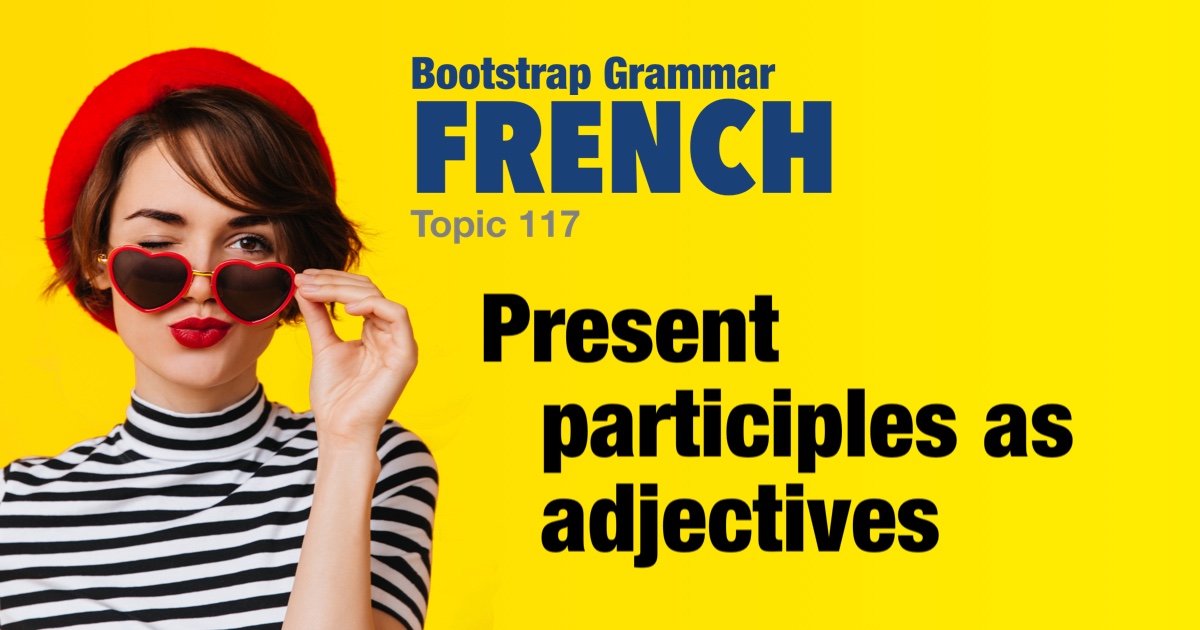French grammar - Present participles as adjectives |
|||
|
|||
Many verbs can become adjectives using the present participle form. For instance the verb decevoir ('to disappoint'): Its past participle déçu means 'disappointed'. But also its present participle décevant is an adjective meaning 'disappointing' or 'that which disappoints' The present participle may vary considerably from the meaning of the root verb. The masculine singular present participle is formed by dropping -ons from the nous present tense conjugation and adding -ant. -- So decevoir conjugated is nous décevons - drop the -ons and add -ant gives the present participle décevant. There are three exceptions (avoir, être & savoir) but their present participles are never used as adjectives (gerunds are covered in a later topic). Like all adjectives, these too should agree in gender and number. |
| Examples: | |
|
Ça le déçoit. Il est déçu. Le résultat est décevant.
That disappoints him. He is disappointed. The result is disappointing.
|
|
|
Ça m'embarrasse. Je suis embarrassé. Mon nez rouge est embarrassant.
It embarrasses me. I am embarrassed. My red nose is embarrassing.
|
|
|
Ça le dégoûte. Il est dégoûté. Il trouve les escargots dégoûtants.
That disgusts him. He is disgusted. He finds snails disgusting.
|
|
|
Elle s'intéresse aux sciences. Elle trouve particulièrement la chimie intéressante.
She is interested in science. She particularly finds chemistry interesting. |
|
|
Ça leur fait peur. Ils ont peur. Le chien qui aboie est effrayant.
They are frightened. The barking dog is frightening.
|
|
|
N'es-tu pas surpris ? La nouvelle n'est-elle pas surprenante ?
Aren't you (familiar) surprised? Isn't the news surprising?
|
|
|
Ils me fatiguent. Je suis fatigué. Les jeunes enfants sont si fatigants.
They tire me. I'm tired. Young children are so tiring.
|
|
|
Nous sommes inquiets. Ces grosses vagues sont inquiétantes.
We are worried. These big waves are worrying.
|
|
|
Nous sommes très excités. Notre petite voiture rapide est excitante.
We are very excited. Our fast little car is exciting.
|
|
|
Qu'est-ce qui te gêne ? Les mouches sont-elles gênantes ?
What bothers you (familiar)? Are the flies annoying?
|
|
|
J'ai été charmé. Je trouve ces filles charmantes.
I have been charmed. I find these girls charming.
|
|
|
Les histoires nous ont amusés. Ce sont des histoires amusantes.
The stories amused us. These are fun stories.
|
|
|
N'êtes-vous pas choqués ? Si ! Nous sommes choqués. Les prix sont choquants.
Aren't you (plural) shocked? Yes! We are shocked. The prices are shocking.
|
|
|
Il est confus. Le résultat est déroutant.
He is confused. The result is confusing.
|
|
|
Le tennis est très épuisant.
Tennis is very exhausting.
|
|
|
Le rugby - c'est un sport extrêmement exigeant.
Rugby - it is an extremely demanding sport.
|
|
|
J'ai lu un roman fascinant - Madame Bovary de Gustave Flaubert.
I read a fascinating novel - Madame Bovary by Gustave Flaubert.
|
|
|
La maison a de l'eau courante.
The house has running water.
|
|
|
Le prix d'une pizza en Norvège est exorbitant.
The price of a pizza in Norway is exorbitant.
|
|
|
Ces grandes boîtes sont encombrantes.
These large boxes are bulky.
|
|
 |
|




